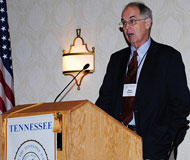Article from: www.thenewspaper.com/news/38/3894.asp
9/13/2012
Tennessee: Officer Testimony Beats Hard Evidence in Speeding Case
Court rules officer opinion on speeding more important than video backed by expert witness.
 Having video evidence backed up by an expert witness that contradicts a police officer's personal opinion that a car was driving fast would seem to be enough to beat a speeding ticket. Charles W. White, Sr was shocked when a Henderson County, Tennessee Circuit Court sided with the traffic cop's testimony over the videotape. On August 31, White was even more surprised that a the Tennessee Court of Criminal Appeals upheld the lower court decision.
Having video evidence backed up by an expert witness that contradicts a police officer's personal opinion that a car was driving fast would seem to be enough to beat a speeding ticket. Charles W. White, Sr was shocked when a Henderson County, Tennessee Circuit Court sided with the traffic cop's testimony over the videotape. On August 31, White was even more surprised that a the Tennessee Court of Criminal Appeals upheld the lower court decision.
The controversy began on July 5, 2010 when Lexington Police Officer Brad Wilson stopped White after receiving a phoned-in tip about White's vehicle. Officer Wilson was driving 42 MPH -- which was above the 35 MPH speed limit -- and he claims he observed White drive faster than him. Wilson did not pace White's car and followed it for less than two hundred feet.
"When you're pacing a vehicle on a continuous plane, 300 feet is an advised policy that we use," Officer Wilson testified. "But if someone is obviously accelerating over the speed limit... we go ahead and stop them as soon as the threat is there... I did not pace him. He was going over 30 miles per hour and at least 42 miles per hour, because I was going that fast and he was going away from me."
Clint Sanders, a registered land surveyor, testified as an expert witness in the case. He personally measured the distance between power poles seen in the dashcam video of the incident and was able to calculate that White's movement through three segments on the road could not have been more than 30 MPH based on his time-distance calculation. Circuit Court Judge Roy B. Morgan was not impressed by this finding and refused to grant a motion to suppress the evidence.
"This expert has testified and has given basically an average speed," Judge Morgan ruled. "His opinion as to an average speed. The officer testified the stop [was] based on 42 miles an hour, at least... We're looking at a video versus on-site opinion... So based upon what I've heard today, I find that there is probable cause and/or a reasonable suspicion to make based upon the 42 mile an hour speed. So my ruling is to deny the motion to suppress."
On appeal, the rules give the prevailing side, the prosecutor here, the benefit of every doubt. By that standard, the appellate judges found no room to disagree.
"The trial court obviously found that Officer Wilson's firsthand observation of the defendant's driving was more accurate than Sanders' calculations made from a video recording taken from a perspective in which it would be impossible to determine the precise moment in which the defendant's vehicle passed the designated markers in order to make such calculations," Judge Alan E. Glenn wrote for the three-judge panel. "The evidence does not preponderate against the trial court's finding."
After the motion to suppress was denied, White was found guilty of driving under the influence of alcohol. A copy of the decision is available in a 75k PDF file at the source link below.
Source: Tennessee v. White (Court of Criminal Appeals, State of Tennessee, 8/31/2012)
Permanent Link for this item
Return to Front Page
 Having video evidence backed up by an expert witness that contradicts a police officer's personal opinion that a car was driving fast would seem to be enough to beat a speeding ticket. Charles W. White, Sr was shocked when a Henderson County, Tennessee Circuit Court sided with the traffic cop's testimony over the videotape. On August 31, White was even more surprised that a the Tennessee Court of Criminal Appeals upheld the lower court decision.
Having video evidence backed up by an expert witness that contradicts a police officer's personal opinion that a car was driving fast would seem to be enough to beat a speeding ticket. Charles W. White, Sr was shocked when a Henderson County, Tennessee Circuit Court sided with the traffic cop's testimony over the videotape. On August 31, White was even more surprised that a the Tennessee Court of Criminal Appeals upheld the lower court decision.